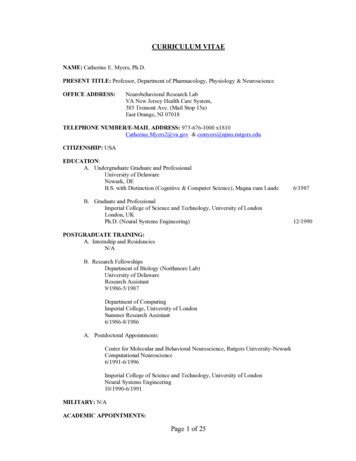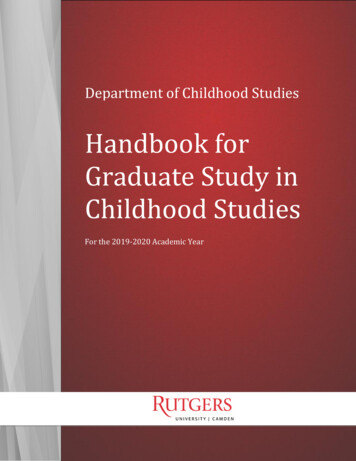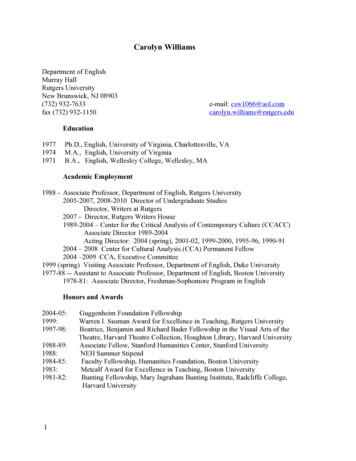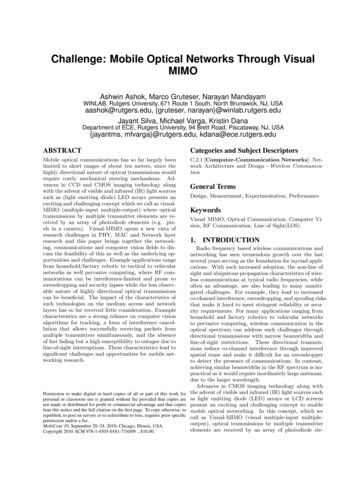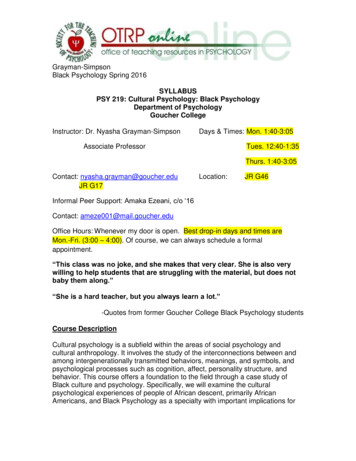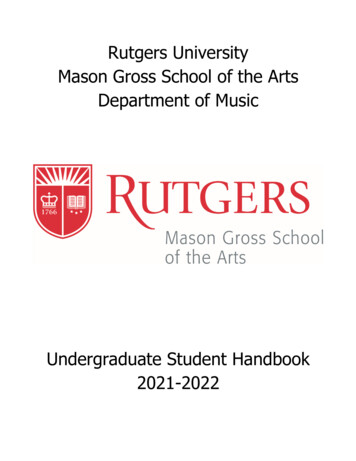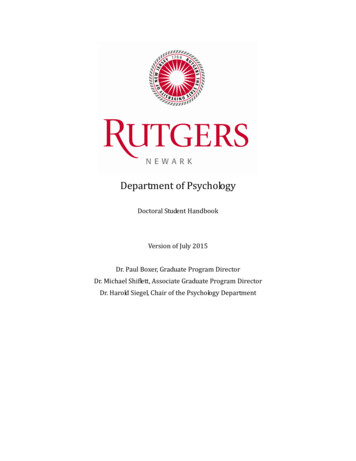
Transcription
Department of PsychologyDoctoral Student HandbookVersion of July 2015Dr. Paul Boxer, Graduate Program DirectorDr. Michael Shiflett, Associate Graduate Program DirectorDr. Harold Siegel, Chair of the Psychology Department
This booklet is intended to provide basic information for your time as a GraduateStudent in Psychology at Rutgers-Newark. It will be updated and revised from time totime. Please keep it available in order to answer the many questions you will haveabout the procedures of our Graduate Program. Additionally, you should consult theRutgers University Graduate School-Newark Catalog. The University Catalog covers alltopics relevant for graduate students including tuition and fees, student services,academic policies and procedures.Please excuse the sometimes formal and detailed description of rules, schedules, anddeadlines in this handbook. We have found that the best way to be fair and to reduceanxious confusion is to spell out these rules clearly and apply them consistently. Ingeneral, any waiver or change in these rules requires a vote of the faculty.Departmental AdministrationGeneral InformationHuman SubjectsGraduate Student Research & Teaching RequirementsNotification of Criteria for Appointment and ReappointmentTA WorkloadTerm of AppointmentTrainingNotificationOverall WorkloadFundingVacation PolicyGraduate Executive CommitteeFormal Requirements for the Doctoral Degree in PsychologyJoint Doctoral Degree with the Business SchoolList of Graduate Core CoursesOverview of Ph.D. Program Requirements by SemesterDepartmental AdministrationChair: Professor Harold Siegel (hisiegel@psychology)Director of the Graduate Program: Professor Paul Boxer (pboxer@psychology)Director of Undergraduate Studies: Professor Gerard LaMorte (gerard@psychology)Department Manager: Ms. Jonah Ridley (jridley@psychology)Principal Accounting Clerk: Ms. Joyleen Capeles (jcapeles@psychology)Administrative Assistant: Ms. Tonya Jasey (tjasey@psychology)Systems Administrator: Mr. John Henes (jhenes@psychology)Systems Assistant: Mr. John Franchak (jfranchak@psychology)2
General InformationMain Office ReceptionThe primary reception area of the Psychology Department is in 301 Smith Hall. Alldeliveries are made to this room.Department ManagerBudgetary and administrative affairs are the responsibility of the DepartmentManager. You are advised to see her if you have any questions regarding policies,procedures, purchases, equipment, etc. that cannot be taken care of by the GraduateSchool Office or your Advisor.Graduate School-NewarkThe graduate school at Rutgers-Newark includes over 20 different doctoral andmasters programs that are attended by well over 1,000 students. The GraduateSchool-Newark is administered from 401 Hill Hall by Dean Kyle Farmbry (ext. 5456).Adriana Afonso (ext. 5197) serves as the business manager.LibraryThe main library of the university is Dana Library, located directly across the plazafrom Smith Hall. The Psychology Department has a small reading collection in thePsychology Commons on the 3rd floor.ComputingThe department has state of the art servers and laser printers (color & B/W) whichare available in the Psychology Commons for general use. Statistical, word-processing,database and general programming software are available. The Psychology Computerlab has PC and Mac workstations for general access to Psychology computingsoftware and services, University wide computing services as well as access to theWWW.Mail BoxesEach graduate student is assigned a mailbox. Mailboxes are located in the main lobbyof the third floor of Smith Hall next to the Main Office. Students should check for mailfairly often, although email will be the department's primary means ofcommunication.EmailEach student will receive an e-mail account on the Psychology Department Serverpsychology.rutgers.edu. Please check your email frequently, as this will be one of themain ways for department communication besides your assigned mailbox.Pay ChecksStipends are paid on a two-week schedule during the term of appointment. Checkscan be picked up in the Main Office in 301 Smith Hall and are usually available onFriday afternoons. Direct Deposit is available.Room Key PolicyTo obtain keys for your office, lab, you must first obtain a key card from the Main3
office (301 Smith Hall). Once this card is filled out, you must take the card to thecashier's office in Blumenthal Hall. There you will be charged 5.00 for each key thatyou request. The cashier's office will give you a receipt. Then you must take thereceipt and the signed key card to the Police Department at 200 University Ave. Thereceptionist there will take the card and receipt from you. The keys will be made in 25 days and are delivered to the Department Office.ID Card/Parking DecalAll Rutgers University students must have a valid ID card. This card is required tocheck out books from Dana Library, to access the department's computer lab, toobtain and use on campus parking, and to enter Smith Hall during the evenings andweekends. To obtain an ID card and a parking decal, see the Administrative Assistantin 301 Smith Hall. There you can obtain an official letter stating that you are faculty, ateaching assistant, or a student. This letter must then be taken to the ID office inBlumenthal Hall. A photograph will be taken of you at that time. It is criticallyimportant that you maintain possession of your ID card at all times. Lending yourcard to a friend can create significant security problems and will result in asignificant loss of privileges on your part.Department Research FundFunds permitting in a given fiscal year, department research monies are available tostudents who have successfully proposed their dissertations and need financialsupport for their dissertation projects. Eligible students may apply to the GraduateExecutive Committee for up to 1,000 in funds to support their research. Onlyreasonable requests for funds directly supporting research activities will beconsidered (e.g., human subject payments; travel to data collection sites; purchase ofstatistical software). Students must provide full accounting and justification for allrequested funds and ensure proper acknowledgement of support in any publicationsor presentations emanating from the funded research. See the Graduate ProgramDirector for application information. This fund has become available as of the fallsemester, 2012, and may not be accessed retroactively.ExpendituresAll research or teaching related expenses must have an appropriate account numberor course number and the prior approval of your Advisor or course instructor.Contact the Department Manager, Room 325 Smith Hall, for information aboutreimbursement procedures and record keeping.PhotocopyingThe department has a copier located in room 349 of Smith Hall. If you are unfamiliarwith the copier, please ask someone in the Main Office to help you. To use the copieryou must have a four-digit log-on number a nd the combination to the copier roomdoor. Obtain your code from the Administrative Assistant and do not share thisnumber with anyone. Undergraduate research assistants and teaching assistants mustobtain their own codes.Travel to ConferencesThe department will reimburse students for travel to conferences in the amount of4
300.00 per academic year for up to four (4) years. Travel funds are only available tostudents who wish to travel to scientific research conferences at which they aremaking presentations (i.e., lead or co-authorship on any poster or paper). Funds in anacademic year may be divided across multiple conferences but the total amount peracademic year can not exceed 300.00. The following limitations apply. Firstly, nosingle reimbursement can exceed 300.00. Secondly, reimbursements can only bemade once the student has submitted original receipts and a photocopy of theconference abstract book indicating the name, location, and duration of theconference as well as the student's abstract to the Department Manager. Your originalreceipts must be submitted no later than two weeks after the conference. This newtravel funding structure is effective as of the fall semester, 2012, and may not beapplied retroactively.Human SubjectsMany students will be conducting research involving human subjects. Every semestera senior Graduate student will be responsible for running the subject pool and canadvise you on the procedures used to obtain volunteers. Students who intend to usehuman subjects must submit an application for human subject approval and receiveapproval before running their experiment.A request for review and clearance of a project involving human subjects is availablefrom the Office of Research and Sponsored Programs (732-445-2799) on the web athttp://orsp.rutgers.edu. Human subject protocols should be submitted to the ORSP,along with 4 copies, before the 12th of the month. Protocols received on or after the12th of the month will not be reviewed until the following month. There is no humansubjects protocol review meeting in August.Importantly, Rutgers University has a mandatory human subjects certificationprogram. This program, which is web based or can be satisfied by viewing the ORSPfilm, must be completed by everyone (whether faculty, graduate student, orundergraduate student) BEFORE they conduct an experiment with human subjects.To learn more about this requirement, check the ORSP web site.Informed ConsentEach subject must sign an informed consent form before involvement in a study. If asubject is under l8 years old, a parent or guardian must sign for him or her. Inaddition, all subjects must be given an information sheet that states the title of theresearch, and the name, address and phone number of the investigator and thesecretary of the Institutional Review Panel. After the study has been run, signedconsents should be saved for safekeeping.Subject ReimbursementCourse CreditSometimes undergraduate students in Principles of Psychology opt to fulfill a courserequirement by serving as a subject in experiments. If you are running a study in5
Smith Hall and would like to advertise your study to this subject pool, you must posta notice on the Psychology department's R-Points System web site. A faculty membermust authorize the research. Moreover, you must have taken and passed theUniversity's on-line human subjects education program before you can post yourexperiment (see Human Subjects above). These posts should contain a word aboutthe nature of the study, the subject time involved, the number of "R" or researchpoints, and the room number in which the study is to be conducted. Please alsoprovide the Main Office with this information.Subject PaymentSometimes laboratories recruit human subjects for pay. The normal rate of pay is 10per hour or 5 per half-hour. See the Department Manager. You can either open apetty cash account to control the flow of human subject payments, or you can submitpaperwork for a reimbursement. In either case, it is critical that you save all signedreceipts as proof of payment.Off Campus Human StudiesShould you plan to conduct research in a setting outside of Rutgers (an elementaryschool, camp, etc.) be in touch with the Graduate Director and your advisor at leasttwo months before you hope to get started. The Graduate Director will verify that youhave submitted and received human subject approval for off campus studies. TheDirector can also help you to make arrangements.You are expected to send general results of any study you conduct in a school to thatschool and to the parents/guardians of children who participated, by the end of theschool term. In rare instances a research study may extend beyond the school year. Ifyou anticipate this, make certain that the Graduate Director has the informationbefore starting negotiations with schools so that the schools are given a clearcommitment as to when staff and parents/guardians are to receive results of theresearch.Graduate Student Research RequirementsEvery Ph.D. candidate in Psychology is expected to conduct experimental researchduring every semester of their graduate career. To make timely and reasonableprogress towards the Ph.D., students can expect to spend a minimum of 20 hours aweek in their research lab and participating in research related activities such asreading journal articles, debating theories, and apprenticing with their graduateadvisors. Such apprenticeship plays a key role in the ability of students to learn theresearch skills and on-going research projects of one's advisor necessary for ascientific career. Even when students are not conducting research that is directlyrelevant to their dissertation, they should be assisting their advisors in the design,implementation, and interpretation of their advisor's research.Graduate Student Teaching RequirementsEvery Ph.D. candidate in Psychology is expected to teach or to assist in the teachingof at least three undergraduate Psychology courses during their graduate career.6
Students opting for a terminal Master's degree are expected to serve as a teachingassistant for at least one undergraduate Psychology course. However, since moststudents are funded as Teaching Assistants for several years, most assist in theteaching of more than three courses over their graduate careers. Graduate studentsmay also teach undergraduate Psychology courses at Rutgers-Newark during thesummer or winter sessions to earn extra money (about 2500 - 3000 depending onqualifications).Most graduate students are funded by research fellowships, known as Daniel S.Lehrman Fellowships, during their first year of graduate school. According toUniversity guidelines, graduate fellows do not teach. During your second, third, and (ifyou intend to complete your Ph.D. in 5 rather than 4 years) fourth years, mostgraduate students are funded as teaching assistants. Again, according to Universityguidelines, teaching assistants normally engage in ten to fifteen hours of teachingactivity. Every attempt will be made to fund students on Fellowships during their finalyear so that they may devote themselves to full time research.Teaching assistantships are intended to expose students to the many skills necessaryfor teaching, and should be part of a progression of responsibilities. Teachingresponsibilities include: monitoring a lab; assisting in large lectures (grading andpreparing materials); leading recitation, discussion and laboratory sections;recruiting and supervising undergraduate teaching assistants; organizing problemsolving sessions; guest lecturing; and teaching stand-alone classes (this last activity isreserved for students who have completed their qualifying exams).Notification of Criteria for Appointment andReappointmentIndividual contract letters shall be issued to Teaching Assistants and Graduate Fellowsupon appointment and reappointment along with written criteria for the assignment.The University encourages the Psychology Department to appoint full-time graduatestudents as full-time teaching assistants and graduate fellows.All currently employed Teaching Assistants shall be notified by the University inwriting of their status for the coming academic year on or before March 31 for Fallsemester appointments and October 31 for Spring semester appointments.Notification shall be either a) reappointment, b) non-reappointment, c) waiting list,with reappointment contingent upon the availability of funding or the meeting ofother previously established and announced criteria. Notification of nonreappointment shall include written explanation of the reasons. Notification ofwaiting-list status shall indicate if reappointment is contingent upon the availabilityof funding or the meeting of other previously established and announced criteria orboth. If notified of waiting-list status, a graduate student shall be further notified ofthe number of Teaching Assistants employed in the department in the current yearand the number of appointments already offered in the department for the comingyear. The names of those individuals who receive notification of non-reappointmentshall, to the extent feasible, be forwarded to the AAUP within 20 working days of their7
receipt by the individuals whom they concern.A graduate student who is placed on a waiting list shall be notified as soon as possiblewith regard to any change in his/her status. If a graduate student on the waiting listrequests in writing, he/she shall receive a second notification in writing on or beforeMay 31 of the number of appointments already offered in the department for thecoming year.TA WorkloadTeaching Assistants who have primary responsibility for a section shall normally benotified in writing at least four weeks prior to the beginning of the semester of theircourse assignment for the coming year. All other Teaching Assistants and allGraduate Fellows shall be notified of their assignments on or before the first day ofclass. It is understood that unexpected circumstances may require modification ofassignments. If a Teaching Assistant's assignment is changed substantiallysubsequent to notification, the University will provide notification in writing of thechange. Graduate students may, at the time of their application for a TeachingAssistant position, indicate any preference they may have with regard to teachingassignments.The individual assignment of a Teaching Assistant or Graduate Fellowship shall beconsistent with the current practice of the department or program. Because of thevariety of duties that may be assigned, consistency in the assignment of TA linesshould be a more reliable guide to individual workload assignments than any strictquantitative measure or comparison with assignments in other departments orprograms. Nevertheless, except for special academic circumstances (for example, anemergent situation in regard to laboratory research or intensive preparation for aperformance), a Teaching Assistant with a standard appointment is expected to work,on average, 10 - 15 hours per week outside of their own course work and research,or a prorated portion thereof if the appointment is less than full standard. Individualclaims that workload assignments are inconsistent with the practices of thedepartment or program shall be brought to the attention of the Graduate Director.Term of AppointmentThe term of the work year for Teaching Assistants and Graduate Fellowships is fromAugust 25th to Commencement. However, the terms of appointment for all Teachingand Graduate Assistants shall be set forth as September 1 to June 30 for payrollpurposes. The period of the work year prior to September 1 are used solely fororientation, training, and preparation related to the Teaching Assistant's assignment.However, graduate students are expected to work towards their degree requirementsyear round.8
TrainingAll Teaching Assistants shall be required, as appropriate, to participate in a teachingeffectiveness workshops. Such workshops shall be designed and conducted by theGraduate School and, when appropriate, by the Psychology Department. All TeachingAssistants and Graduate Fellows are also required to attend the University's trainingon research ethics.NotificationThe University will provide to the AAUP a list of all Teaching Assistants who are onthe payroll as of September 30 and January 31 of each year. Such list shall beprovided within ten working days after September 31 and January 31.Overall WorkloadGraduate students typically receive support from outside agencies (e.g., NSF),research grants (as a Research Assistant (RA), and/or from the PsychologyDepartment teaching budget (as a Teaching Assistant (TA) or a Graduate Fellows(GF). In addition, students during their first two years typically take approximately 3courses or seminars per semester, and attend colloquia, research seminars, labmeetings, and informal discussions. Students who have passed their qualifying examnormally focus on their research and take fewer or no classes during their final years.Expectations regarding a student's time, commitment, responsibilities, level ofperformance in research, teaching, and course work will be conveyed by yourresearch advisor and the Graduate Director. If you do not feel you understand theseexpectations, you should talk to the relevant faculty member(s) or the Director ofGraduate Studies. Regardless of the source of financial support, distribution offinancial support (e.g., l/2 TA, l/2 GF) or number of courses, all full time graduatestudents are expected to be engaged full time in activities related to their training inscholarship, research, and teaching. Therefore, students cannot take on othercommitments such as an additional job without first discussing this with theiradvisor. Any students failing to put in a full time effort toward meeting theirrequirements for the graduate program will have their TA or GF funding terminated.FundingAs stated above, most graduate students are funded as either teaching assistants orgraduate fellows. Teaching assistant salaries are determined by Rutgers Universityand Teachers Union (AAUP). For the current fiscal year, salaries for teachingassistants are about 25,460 and for fellows about 22,800. Both include tuitionremission and some form of health insurance. These salaries are paid twice a monthbeginning in September and ending on June 30th. Fellowships and TAships do notpay summer salaries. Graduate students may receive extra pay by working on grantfunded projects or by teaching Psychology courses during the summer or winter9
term.Vacation PolicyRegardless of the source of student's financial support, graduate students areexpected to work essentially full time fulfilling degree requirements. Vacation timeshould be discussed with advisors. Graduate students accrue no specific vacation timeother than the normal holiday periods observed by the University, such as winterrecess, spring break and the inter-term period. Vacation time may not beaccumulated for later use. Students are expected to spend the summer monthsconducting research.Graduate Executive CommitteeThe Graduate Program Director consults regularly with the department’s GraduateExecutive Committee (GEC) on matters involving course offerings, policy-making,and student performance and concerns. The GEC is composed of the DepartmentChair, The Graduate Program Director, and three faculty members, usually chosen toensure full representation on the GEC of all training areas in the department. GECmembers typically serve a 2 year term.Formal Requirements for the Doctoral Degree inPsychologyCore ProgramThe Graduate Program in Psychology offers training in the Social and BehavioralSciences in four core program areas: 1) Neuroscience; 2) Perception/Cognition; 3)Social Psychology; and 4) Developmental Psychology. The curriculum provides basicinstruction in research methods and these core areas. Graduate students are expectedto choose an advisor and specialize in one of these four core areas early in theircareer. There is a strong emphasis on research, empirical methods and presentationskills throughout the duration of graduate studies.The curriculum is organized around these same concentrations or areas ofspecialization. Each area contains several courses. These courses, along with a seriesof research methodology, research design, and our pro-seminar course, form thebasic course requirements. In addition, students are encouraged to participate in thespecialized courses presented by the Rutgers Business School, the Rutgers School ofCriminal Justice, the Rutgers Center for Molecular and Behavioral Neuroscience, theDepartment of Psychology at New Brunswick, the Public Administration Program,and the NJIT computer science program, and other relevant programs. The essenceof the program, however, is the ongoing research conducted by each student underthe direct supervision of a faculty member. Students are expected to begin researchwith a faculty advisor as soon as they enter the program. Students are also free to10
change their faculty advisors with the approval of both parties and the GraduateDirector. Student research continues until completion of the degree and they areexpected to demonstrate their achievements with periodic written or oralpresentations and published papers. Requirements are occasionally updated. Studentsneed to complete the requirements that are in place when they are admitted.Course Credit RequirementsDoctoral students are required to complete 72 credits of coursework in psychology.These are divided across several categories. The distribution is presented below.Note that for foundation courses, there are only two courses required – theproseminar is offered every other year and a research seminar is offered everysemester. For other courses, specific offerings vary on a semester-by-semester basisand students are advised to check with the Graduate Program Director forinformation on upcoming offerings. The specific titles listed below are examples ofcourses offered in those content areas.Foundation Courses (4 credits; 4 courses)Psychology Proseminar (1 credit)Psychology Research Seminar (1 credit x 3 semesters)Statistics and Methodology Courses (6 credits; 2 courses)Behavioral Science Research DesignMultivariate MethodsCognitive Neuroscience Research MethodsfMRI Theory and MethodsDevelopmental Psychology Courses (6 credits; 2 courses)Developmental PsychologyEmotionsAggression and ViolenceSocial Psychology Courses (6 credits; 2 courses)Social PsychologySocial CognitionMediation of ConflictAttachmentCognitive Neuroscience Courses (6 credits; 2 courses)Introduction to Cognitive NeuroscienceLanguage, Reading and Cognition11
Achievement and MotivationPerception/Cognition Courses (6 credits; 2 courses)PerceptionCognitive ProcessesLearning and MemoryResearch in Psychology (38 credits)At times, certain courses can be applied to fulfilling requirements in more than onecontent area. For example, a course on “Cognitive Development” might be applied toDevelopmental or Perception/Cognition requirements, but never both. That is, astudent may count a single course as a requirement for only one content area.Along with specific courses, students are expected to sign up for research credits. Thisaspect of the program is essentially an apprenticeship in research, with the studentworking under the close supervision of a faculty member. Students are expected toselect a faculty advisor at the time that they enter the program. They will beginimmediately to participate in their advisor's ongoing research projects, developingtheir own projects as soon as they (and their advisor) feel they are ready. Studentsare expected to present their results at colloquia, symposia, and conferences, and,eventually to submit their work for publication.Doctoral students typically are limited to 9 credits per semester to maintain full-timestatus. Students should enroll in a full 9 credits per semester for each of their first 8semesters (total 72 credits) to meet credit requirements, and enroll in“matriculation continued” as needed to complete their dissertation research.Transfer of CreditsA maximum of 18 graduate credits may be transferred from other institutions, notincluding research credits. (All research credits must be taken in the Rutgers-NewarkPsychology Department.) The Graduate Program Director has sole authority, withconsultation from the Graduate Executive Committee as needed, to decide whichcredits to transfer based on a reading of the student’s transcript and any otherinformation the Director deems relevant (e.g. a syllabus). The student may schedule ameeting with the Graduate Director at any time after admissions to consider whichcourses taken elsewhere may be transferred. However, credits will only be officiallytransferred after the student has successfully passed the comprehensiveexamination.Scheduling of Graduate Psychology CoursesGiven the size of our graduate program, courses across content areas are offered inflexible, typically two year cycles. It is essential that students consult with theiradvisor and if necessary with the Graduate Director to determine course schedules. Ifa student enters the graduate Psychology program with a moderate to weak statistical12
background, he or she may be asked to take undergraduate statistics (301) during hisor her first fall semester. Foreign students coming from a country in which English isnot a common language may be tested for their English skills during the firstsemester of their first year. In this way, any weaknesses in a student's mastery ofEnglish can be addressed before that student serves as a teaching assistant during hisor her 2-4th years in the program. Below is a typical plan of study for a doctoralstudent in our program:YEAR 1FallSpringProseminarMultivariate MethodsBehavioral Science Res DesignPerceptionSocial PsychologySpecial Topics in Development PsycResearch in Psychology (2 cr)YEAR 2FallSpringCognitive ProcessIntro Cog NeurosciSpecial Topics in Social PsycDevelopmental PsycResearch in Psychology (2 cr)Research in Psychology (2 cr)Research SeminarResearch SeminarYEAR 3FallSpringfMRI Theory & MethodsSocial CognitionEmotional DevelopmentAchievement & MotivationResearch in Psychology (3 cr)Research in Psychology (2 cr)Research SeminarYEAR 4FallSpringResearch in Psychology (9 cr)Research in Psychology (9 cr)YEAR 513
FallSpringMatric Continued (1 cr)Matric Continued (1 cr)Grade RequirementsGraduate students are graded in each course at the end of each term according to thefollowing Rutgers specific format (taken from the Graduate School-Newark Catalog).GradeDefinitionOutstandingNumerical EquivalentA4.0B 3.5BGood3.0C 2.5CSatisfactory2.0FFailure0.0Research courses at the 700 level and regular courses taken "not for credit" are notgraded according to the above format and instead are graded as either S(satisfactory) or U (Unsatisfactory). Students may also receive a "W" gr
Rutgers University Graduate School-Newark Catalog. The University Catalog covers all topics relevant for graduate students including tuition and fees, student services, . Each student will receive an e-mail account on the Psychology Department Server psychology.rutgers.edu. Please check your email frequently, as this will be one of the .
